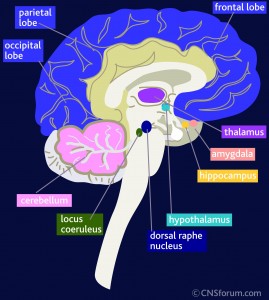Alicia Sparks’s post “Treating Depression and Folate Deficiency with Medical Foods” on PsychCentral discusses a fascinating topic. I was supposed to be part of the media briefing she participated in, but couldn’t be there, so I wanted to feature her post on the topic, which you can get to by clicking here.
The scientific media briefing I watched this morning, “Feeding the Brain to Help Manage Depression: The Role of Medical Foods,” was presented by Rakesh Jain, M.D., M.P.H., the Director of Psychiatric Drug Research at R/D Clinical Research Center in Lake Jackson, TX and Teodoro Bottiglieri, Ph.D. of the Baylor Institute of Metabolic Disease, and sponsored by Pamlab, a pharmaceutical company specializing in prescription medical foods. Neither PsychCentral.com nor myself is affiliated with Pamlab or Deplin, the new medical food discussed during the briefing.
Now that that’s out of the way, on to the more interesting stuff.
“Can we feed the brain to regulate mood disorders?”
If you had no experience with or knowledge of medical foods (meant for nutritional or dietary management of specific diseases), you might’ve thought Jain and Bottiglieri were referring to feeding the brain – and our bodies – with actual food when you heard that question.
Instead, the men were referring to medical foods – more specifically, a new product called Deplin, a medical food that includes L-methylfolate, the only active form of folate that can cross the blood brain barrier and help with the synthesis of the neurotransmitters associated with mood and, consequently, mood disorders such as depression: serotonin, dopamine, and norepinephrine.
Research shows that people with depression and low folate levels are less likely to respond to treatments such as antidepressants and less likely to achieve remission.
(Unfortunately, a smorgasbord of factors can contribute to low folate levels – genetics, age, lifestyle choices like poor diets and smoking, certain medications like anticonvulsants, oral contraceptives, and lithium, and certain illnesses like Crohn’s disease, hypothyroidism, and diabetes, just to name a few.)
Well, that makes sense, right? I mean, if you need folate to help synthesize the neurotransmitters, and you don’t have enough folate, the neurotransmitters won’t be properly synthesized and your depression – even with the assistance of antidepressants – probably won’t get better. Or, at least, the chances of you getting better – and staying better for longer periods of time – will be decreased.
What didn’t make sense to me during most of the briefing was why folic acid and natural forms of folate (the kind you can get from green vegetables, for example) wouldn’t work just as well?
In other words, why do we need yet another pill?
How can you blame me? This column is called “Midweek Mental Greening,” after all.
Well, as it turns out, folic acid (which is a man-made product and can actually block L-methylfolate from crossing the blood brain barrier) has to go through a four-step process throughout our bodies before our brains can use it. Natural folate from green vegetables has to go through a three-step process. When time is of the essence, as it often is in cases of severe depression and other mood disorders, these three- and four-step processes just aren’t quick enough.
Combine the time problem with the fact that many people can’t make the necessary changes in order to increase folate (for example, people taking anticonvulsants aren’t likely to stop just because they need more folate, people with Crohn’s disease and diabetes face nutritional challenges they can manage but not eliminate, and elderly people can’t turn back the clock) and the fact that Deplin is immediately put to use once absorbed, and the “need” for yet another pill might not leave such a bad taste in the mouth.
A recording of the media briefing will be available soon, and in the meantime you can learn more about Deplin and folate deficiency at www.deplin.com. Of course, you shouldn’t use any of this information to diagnosis yourself and/or label Deplin as your wonder drug medical food. If you suffer from depression for which other treatments don’t seem to be working and you fall into one of the categories of folks at risk for folate deficiency, be smart about it: Make an appointment with your doctor.
To get to Alicia’s blog, click here.
* Click here to subscribe to Beyond Blue and click here to follow Therese on Twitter and click here to join Group Beyond Blue, a depression support group. Now stop clicking.

